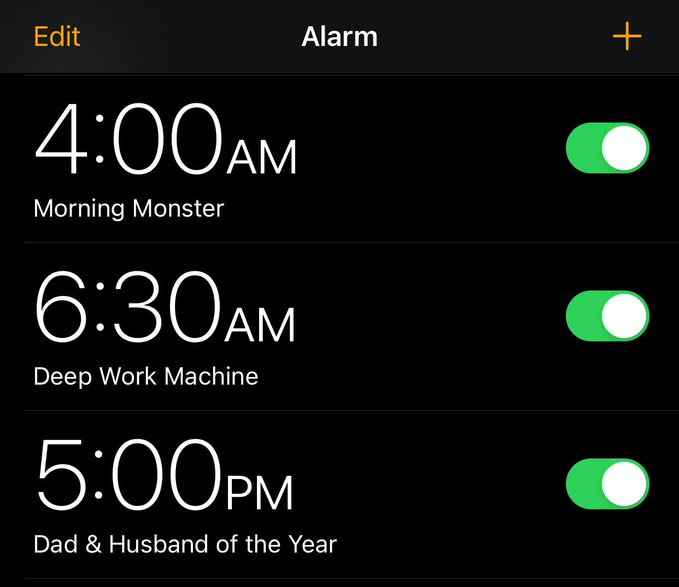The Elusive Pursuit of Work/Life Balance
I’ll start with a couple housekeeping items:
You may notice this newsletter coming through a different platform. I switched from Revue to Substack and most of you were subscribed to my previous Revue newsletter. Twitter recently discontinued Revue (one of many changes since Elon Musk taking over). No change on my end with the content, just a different hosting platform
Between having a 2nd child, and getting really busy at work, I fell off the wagon with this newsletter the second half of 2022. I’m committed to sticking with the bi-weekly cadence throughout 2023 so expect these to come through more regularly this year…every other Tuesday at 10AM EST
Back to the topic…work/life balance. If you’re like me, this is a phrase you’ve heard countless times, and probably used yourself. “How’s your work/life balance?” “What are you doing to improve your work/life balance?” “Which of these job options will give you better work/life balance?”
I think it’s something worth striving for, but boy is it elusive! Some might say impossible. I recently listened to a podcast episode where Alex Bridgeman interviewed Judd Lorson. Really good conversation that you should check out. Judd breaks down life into 3 areas:
Family/spiritual
Personal/health
Professional
Lots of different ways you could slice/dice this, but I thought this breakdown made sense. Some might argue that work/life balance means giving exactly 33.33% focus to each one of these. Judd argues that while this sounds great in theory, it’s unlikely you can really achieve this at any given point in time. The demands of any one of these might spike for a period of time causing you to have to shift focus. You might have a child which means family takes more time. You could have a major surgery which means health and recovery is consuming almost all of your time. Or you might have just gotten a big promotion at work and be thrown into a challenging situation that requires working 65 hours a week.
I ran across a related concept in a book I just read called Choosing to Cheat: Who Wins When Family and Work Collide. One of the core points the author makes is that you could always invest more time into either family or work and they would benefit from it. There simply aren’t enough hours in the day/week to do everything you’d like to in order to fully optimize either of these. I know from a work standpoint the list of things I see at any point in time that could improve the business is WAY longer than me or my team’s bandwidth to execute on everything. Therefore, working an extra hour each day would certainly benefit the business as there are endless areas to improve. The same holds true for family, and for personal/health.
So all that being said, what the heck are we to do? If we can never achieve perfect balance, and if each area of life would always like more time & attention, how do we move forward? I’ll share a few ideas I picked up either from the podcast, book, or my own reflections, which I’ve found helpful in approaching this…
Rebalance Over Time
At any given point in time, one area of life is likely to require the most time and attention. That’s ok, you just can’t let that imbalance last forever. Ideally you want to swing the pendulum back in the other directions so that over time, there’s approximate balance. Ironically as I’m writing this, Patrick Dichter just did a Twitter thread on this same concept and the need to rebalance.
I’m living this one out right now. Coming off a period of time where work was especially demanding, I’m unemployed for the first time in my adult life. This period likely won’t last long, and I’m having to devote some time to finding my next job. But I’ve been able to shift some energy towards family and personal/health. Whether that’s taking my son Rory for a mid-day walk (just got back from doing that), reading more, or doing that daily stretching that I’d often skip. I’m enjoying the temporary lull in my professional life, to rebalance in favor of the other areas that might have recently taken a backseat.
But Don’t Let Any Go Near Zero
That being said, it’s generally a bad idea to let any given area go towards zero, unless I suppose you’re in retirement or some other specific reason where you don’t have to spend any energy on a given area. It wouldn’t be prudent for me to totally ignore the job search, and spend all my time on family and health. Similarly if things are busy at work, I probably shouldn’t ditch working out altogether and start eating McDonalds for every meal. While there will be ebbs and flows, be careful not to let your attention fall too low in any of these important facets of life.
Schedule to Maintain Some Balance
While there’s certainly something to be said for spontaneity, I think scheduling in time to focus on each of these areas is important. That could be getting the date night on the calendar and a babysitter arranged a month in advance. Or it could be blocking out 7-8AM every morning for a workout. One of my commitments in the new year is to put my phone away from 6-8PM every evening to be totally focused and present for my wife and children.
This was a bit over the top for me, but Sahil Bloom’s "Character Alarm Method" is another way to approach scheduling time to focus on each of these key aspects of life, and shifting your mindset for each of these “characters” you want to embody.
Combine When Possible
Another hack I like is to use a single activity to combine focus in multiple areas. For example a family walk in the evening could check the box in both family but also health. Same thing with taking a work call while walking outside and getting some steps in, or even running while listening to a business-oriented podcast. Taking your family to a work social event could also count. There are limits to multitasking, but look for opportunities to kill two birds with one stone.
Periodically “Cheat”
A main premise of the book “Choosing to Cheat” is selectively choosing to cheat on either your family or work with the other. There was one example in the book that stuck with me. The author is a Christian pastor, and there was a night of the week, let’s call it Tuesdays, where he always had a meeting. His son would play baseball games a few times a week, with one of those being Tuesday nights. He would typically miss those games, but one week his son had an especially important game and he chose to “cheat on work” by attending his son’s game instead.
I thought this was a good example because it wasn’t feasible to miss that Tuesday meeting every week, but choosing to that one week meant the world to his son. Now I don’t believe in deceiving anyone and pretending to work when you really aren’t or anything like that. But I do think the occasional exceptions to the rule are healthy as long as you’re transparent with everyone involved.
Prioritize and Determine Your Primary Calling
I saved this one for last but honestly it’s probably the most important one in this list. When it comes to family vs. work, you should consider where you’re replaceable vs. where you aren’t. In the case of work, even if you’re the CEO or owner of the business, you can be replaced. In terms of being a husband to your wife or father to your children, you are not replaceable. This is really important to consider when setting your priorities.
When you add personal/health to the mix, I look at that as the foundation. If you don’t have your energy and health, then you might not be able to fully be there for your family or your career.
In summary, work/life balance is elusive. I’ve seen it referred to as work/life integration, including in this really good paper by A.J. Wasserstein and a couple others. Regardless how you want to define it, I think it’s a dynamic worth considering, especially at the start of a new year which is a time many people reset and refocus. Hoping this article helps you to pause and think about it, while also giving you some frameworks for reflecting on how to get better.
Here are several recommendations of interesting things I’ve read, watched, or listened to in the past few weeks:
Article - Clear is Kind. Unclear is Unkind by Brene Brown - short, simple article with an important message. This is an area I can improve, I sometimes avoid the tough conversation and beat around the bush. As Brown points out, this can be problematic. While counterintuitive, often addressing something head on with clarity is the kind thing to do
Book - Thirty Million Words: Building a Child's Brain by Dana Suskind - with 2 kids under 2, this was really helpful in showing the importance of talking to them a lot. It not only provides the rationale, but some helpful tactics including the framework of tune in, talk more, and take turns
Article - Overcoming Your Demons by Morgan Housel - powerful story on overcoming challenges. Having read many articles by Housel and heard him speak a few times, I had no idea his struggle with stuttering
Movie - 21 Bridges - my sister in-law recommended this one. It’s one of the last movies Chadwick Boseman was in before passing away. Action-packed, a few twists and turns in the plot, I enjoyed it. Available on Netflix
Quote - Forgiveness is accepting the apology you will never receive. Shawne Duperon





